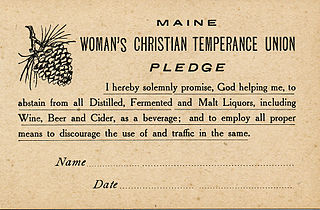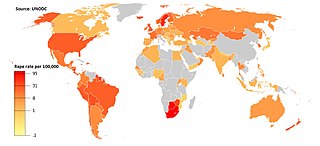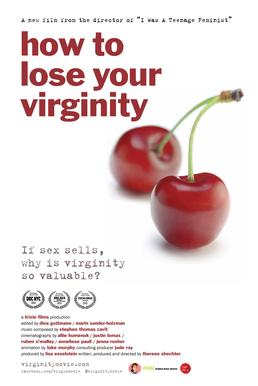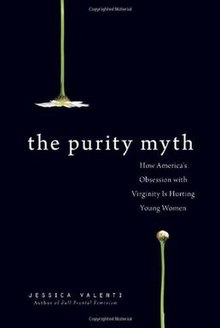
Chastity, also known as purity, is a virtue related to temperance. Someone who is chaste refrains either from sexual activity that is considered immoral or from any sexual activity, according to their state of life. In some contexts, for example when making a vow of chastity, chastity means the same as celibacy.

Sexual intercourse is sexual activity involving the insertion and thrusting of the penis inside the vagina for sexual pleasure, reproduction, or both. This is also known as vaginal intercourse or vaginal sex. Other forms of penetrative sexual intercourse include anal sex, oral sex, fingering and penetration by use of a dildo. These activities involve physical intimacy between two or more individuals and are usually used among humans solely for physical or emotional pleasure and can contribute to human bonding.

Sexual abstinence or sexual restraint is the practice of refraining from some or all aspects of sexual activity for medical, psychological, legal, social, philosophical, moral, religious or other reasons. Sexual abstinence is distinct from asexuality, which is a sexual orientation where people feel little or no sexual attraction. Celibacy is sexual abstinence generally motivated by factors such as an individual's personal or religious beliefs. Sexual abstinence before marriage is required in some societies by social norms, or by law in some countries. It is a part of chastity.

Virginity is the state of a person who has never engaged in sexual intercourse. The term virgin originally only referred to sexually inexperienced women, but has evolved to encompass a range of definitions, as found in traditional, modern and ethical concepts. Heterosexual individuals may or may not consider loss of virginity to occur only through penile-vaginal penetration, while people of other sexual orientations often include oral sex, anal sex, or manual sex in their definitions of losing one's virginity.

Abstinence pledges are commitments made by people, often though not always teenagers and young adults, to practice abstinence, usually in the case of practicing teetotalism with respect to abstaining from alcohol and other drugs, or chastity, with respect to abstaining from sexual intercourse until marriage; in the case of sexual abstinence, they are sometimes also known as purity pledges or virginity pledges. They are most common in the United States among Catholic and Evangelical Christian denominations, while others are nonsectarian.
The law of chastity is a moral code defined by the Church of Jesus Christ of Latter-day Saints. According to the church, chastity means that "sexual relations are proper only between a man and a woman who are legally and lawfully wedded as husband and wife." Therefore, abstinence from sexual relations outside of marriage, and complete fidelity to one's spouse during marriage, are required. As part of the law of chastity, the church teaches its members to abstain from adultery and fornication.

Rape culture is a setting, studied by several sociological theories, in which rape is pervasive and normalized due to societal attitudes about gender and sexuality. Behaviors commonly associated with rape culture include victim blaming, slut-shaming, sexual objectification, trivializing rape, denial of widespread rape, refusing to acknowledge the harm caused by sexual violence, or some combination of these. It has been used to describe and explain behavior within social groups, including prison rape and in conflict areas where war rape is used as psychological warfare. Entire societies have been alleged to be rape cultures. It is associated with rape fantasy and rape pornography.
Date rape is a form of acquaintance rape and dating violence. The two phrases are often used interchangeably, but date rape specifically refers to a rape in which there has been some sort of romantic or potentially sexual relationship between the two parties. Acquaintance rape also includes rapes in which the victim and perpetrator have been in a non-romantic, non-sexual relationship, for example as co-workers or neighbors.

Purity rings are rings worn as a sign of chastity. Since the 1990s, in the United States, Christian organizations, especially Catholic and evangelical Christian groups, promoting virginity pledges and virginity before marriage, like True Love Waits and Silver Ring Thing, used the purity ring as a symbol of commitment. Wearing a purity ring is typically accompanied by a religious vow to practice abstinence until marriage. Chastity rings are part of the abstinence-only sex education movement and are intended to act as a physical reminder of their chastity vow.
A purity ball is a formal dance event typically practiced by some conservative Christian groups in the United States. The events are attended by fathers and their teenage daughters in order to promote virginity until marriage. Typically, daughters who attend a purity ball make a virginity pledge to remain sexually abstinent until marriage. Fathers who attend a purity ball make a promise to protect their young daughters' "purity of mind, body, and soul." The balls are considered a part of purity culture.
Adolescent sexuality is a stage of human development in which adolescents experience and explore sexual feelings. Interest in sexuality intensifies during the onset of puberty, and sexuality is often a vital aspect of teenagers' lives. Sexual interest may be expressed in a number of ways, such as flirting, kissing, masturbation, or having sex with a partner. Sexual interest among adolescents, as among adults, can vary greatly, and is influenced by cultural norms and mores, sex education, as well as comprehensive sexuality education provided, sexual orientation, and social controls such as age-of-consent laws.
The sexuality of US adolescents includes their feelings, behaviors and development, and the place adolescent sexuality has in American society, including the response of the government, educators, parents, and other interested groups.

Jessica Valenti is an American feminist writer. She was the co-founder of the blog Feministing, which she wrote for from 2004 to 2011. Valenti is the author of five books: Full Frontal Feminism (2007), He's a Stud, She's a Slut (2008), The Purity Myth (2009), Why Have Kids? (2012), and Sex Object: A Memoir (2016). She also co-edited the books Yes Means Yes: Visions of Female Sexual Power and A World Without Rape (2008), and Believe Me: How Trusting Women Can Change the World (2020). Between 2014 and 2018, Valenti was a columnist for The Guardian. She currently runs the Abortion, Every Day newsletter on Substack. The Washington Post described her as "one of the most successful and visible feminists of her generation".
Feminist views on pornography range from total condemnation of the medium as an inherent form of violence against women to an embracing of some forms as a medium of feminist expression. This debate reflects larger concerns surrounding feminist views on sexuality, and is closely related to those on prostitution, BDSM, and other issues. Pornography has been one of the most divisive issues in feminism, particularly in Anglophone (English-speaking) countries. This division was exemplified in the feminist sex wars of the 1980s, which pitted anti-pornography activists against pro-pornography ones.
Sexuality in South Korea has been influenced by culture, religion, and westernization. Viewpoints in contemporary society can be viewed as a conflict between the traditional, conservative older generation and the more liberal and 'modern' generation. Due to this conflict, several issues in Korea, including sexual education, homosexuality, and sexual behavior are highly contested.

Jaclyn Friedman is an American feminist writer and activist known as the co-editor of Yes Means Yes: Visions of Sexual Power and a World Without Rape and Believe Me: How Trusting Women Can Change the World, the writer of Unscrewed: Women, Sex, Power and How to Stop Letting the System Screw Us All and What You Really Really Want: The Smart Girl’s Shame-Free Guide To Sex and Safety, a campus speaker on issues of feminism, sexual freedom and anti-rape activism, and the founder and former executive director of Women, Action & The Media.

How to Lose Your Virginity is an American documentary film directed by Therese Shechter and distributed by Women Make Movies. The film examines how the concept of virginity shapes the sexual lives of young women and men through the intersecting forces of history, politics, religion and popular culture. It premiered at DOC NYC, a New York City documentary festival, on November 17, 2013.
Gray rape, also spelled as grey rape, is a colloquial description of sexual intercourse for which consent is dubious, ambiguous or inadequately established and does not meet the legal definition of rape. The term was popularized by Laura Sessions Stepp in her viral 2007 Cosmopolitan article "A New Kind of Date Rape", which says gray rape is "somewhere between consent and denial and is even more confusing than date rape because often both parties are unsure of who wanted what". The term "gray rape" has been criticized. Lisa Jervis, founder of Bitch magazine, argued that gray rape and date rape "are the same thing" and that the popularization of the gray rape concept constituted a backlash against women's sexual empowerment and risked rolling back the gains women had made in having rape taken seriously.
Rape myths are prejudicial, stereotyped, and false beliefs about sexual assaults, rapists, and rape victims. They often serve to excuse sexual aggression, create hostility toward victims, and bias criminal prosecution.
Purity culture is a subculture within Christianity which emphasizes subjective individual "purity," generally associated with female chastity.









